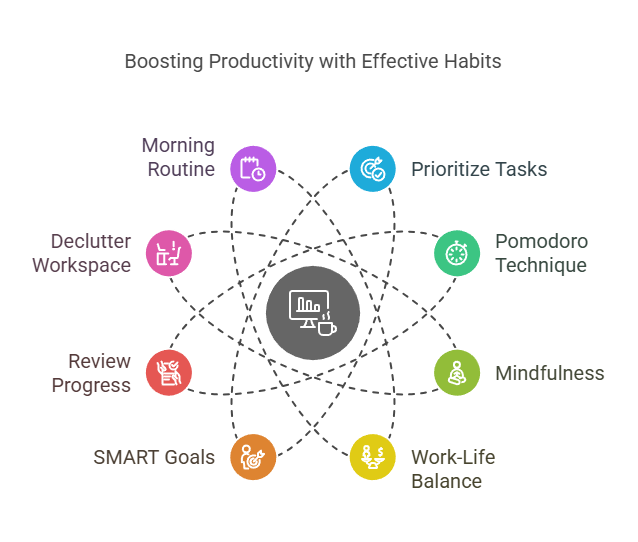Productivity stands as an essential requirement in our rapidly moving modern world beyond being just a popular term.
Productive habits can transform how you manage your day whether you work full time, study at school or strive to optimize your daily routine.
Productive habits represent what you need to focus on in order to enhance your efficiency and reach your goals but how do you develop these beneficial routines?
The Benefits of Developing Productive Habits
Developing productive habits offers a multitude of benefits that extend beyond just getting more done.
These habits can transform your life in ways you might not expect.
Increased Efficiency and Time Management
One of the most immediate benefits of productive habits is improved efficiency.
By prioritizing tasks and focusing on what truly matters, you can accomplish more in less time.
This not only boosts your productivity but also frees up time for other important activities, such as spending time with loved ones or pursuing hobbies.
Reduced Stress and Improved Mental Health
Productive habits can also lead to reduced stress and improved mental health.
When you have a clear plan and know what needs to be done, you’re less likely to feel overwhelmed.
Additionally, habits like mindfulness and regular exercise can help reduce anxiety and improve overall well-being.
Long-Term Success and Personal Growth
Finally, productive habits contribute to long-term success and personal growth.
By consistently working towards your goals and making incremental progress, you’ll be able to achieve more over time.
These habits also foster a growth mindset, encouraging you to continuously learn and improve.
Top 10 Productive Habits to Adopt
Now that we’ve covered the basics, let’s dive into the top 10 productive habits that can help you boost your efficiency and achieve your goals.
1. Prioritize Tasks with the Eisenhower Matrix
The Eisenhower Matrix is a powerful tool for prioritizing tasks based on their urgency and importance. By categorizing tasks into four quadrants—urgent and important, important but not urgent, urgent but not important, and neither urgent nor important—you can focus on what truly matters and avoid wasting time on trivial tasks.
2. Implement the Pomodoro Technique
The Pomodoro Technique is a time management method that involves working in focused intervals (typically 25 minutes) followed by short breaks. This technique helps maintain focus and prevent burnout, making it easier to tackle large tasks.
3. Practice Mindfulness and Meditation
Mindfulness and meditation are powerful practices that can improve focus, reduce stress, and enhance overall well-being. By incorporating these practices into your daily routine, you can cultivate a calm and focused mind, which is essential for productivity.
4. Maintain a Healthy Work-Life Balance
A healthy work-life balance is crucial for long-term productivity. Overworking can lead to burnout, which negatively impacts both your personal and professional life. Make sure to set boundaries and allocate time for relaxation and leisure activities.
5. Set SMART Goals
SMART goals are Specific, Measurable, Achievable, Relevant, and Time-bound. By setting SMART goals, you can create a clear roadmap for success and track your progress along the way.
6. Regularly Review and Reflect on Progress
Regularly reviewing and reflecting on your progress is essential for continuous improvement. Take time to assess what’s working and what’s not, and make adjustments as needed.
7. Declutter Your Workspace
A cluttered workspace can be a major distraction and hinder productivity. Take time to organize your workspace and create an environment that promotes focus and efficiency.
8. Develop a Morning Routine
A morning routine sets the tone for the rest of the day. By starting your day with productive habits, such as exercise, meditation, or planning, you can boost your energy and focus.
9. Limit Multitasking
Multitasking can actually reduce productivity and increase the likelihood of errors. Instead, focus on one task at a time and give it your full attention.
10. Stay Physically Active
Physical activity is not only good for your health but also boosts productivity. Regular exercise improves focus, energy levels, and overall well-being, making it easier to stay productive throughout the day.
How to Build and Sustain Productive Habits
Building and sustaining productive habits requires a strategic approach. Here are some tips to help you get started.
Start Small: The Power of Micro-Habits
One of the most effective ways to build new habits is to start small. Micro-habits are tiny, manageable actions that can be easily incorporated into your daily routine.
For example, if you want to develop a habit of reading, start by reading just one page a day. Over time, you can gradually increase the amount.
Use Habit Stacking to Build New Routines
Habit stacking involves linking a new habit to an existing one.
For example, if you already have a habit of drinking coffee in the morning, you could stack a new habit of journaling by doing it right after your coffee.
This makes it easier to remember and integrate the new habit into your routine.
Track Your Habits with Apps and Journals
Tracking your habits can help you stay accountable and monitor your progress.
There are many apps and journals available that make it easy to track your habits and see how far you’ve come.
Overcoming Common Obstacles
Building new habits isn’t always easy, and there are common obstacles that can get in the way. Here’s how to overcome them.
Dealing with Procrastination
Procrastination is one of the biggest barriers to productivity.
To overcome it, try breaking tasks into smaller, more manageable steps and focus on getting started rather than completing the entire task.
Managing Distractions
Distractions can derail your productivity. To manage them, identify your biggest distractions and take steps to minimize them.
This could involve turning off notifications, setting boundaries with others, or creating a dedicated workspace.
Staying Motivated
Staying motivated can be challenging, especially when progress is slow.
To stay motivated, remind yourself of your goals and the reasons why you’re working towards them. Celebrate small wins along the way to keep your momentum going.
Advanced Tips for Maximizing Productivity
Once you’ve mastered the basics, there are advanced strategies you can use to take your productivity to the next level.
Leveraging Technology for Automation
Technology can be a powerful tool for automating repetitive tasks and freeing up time for more important activities.
For example, you can use automation tools like Zapier or IFTTT to streamline workflows and reduce manual effort.
The Role of Nutrition in Productivity
Nutrition plays a crucial role in energy levels and cognitive function.
Eating a balanced diet that includes plenty of fruits, vegetables, and whole grains can help you stay focused and productive throughout the day.
The Importance of Sleep and Rest
Sleep is essential for productivity. Lack of sleep can impair cognitive function, reduce focus, and increase the likelihood of errors.
Make sure to prioritize sleep and take regular breaks to rest and recharge.
Conclusion
Developing productive habits is one of the most effective ways to boost your efficiency and achieve your goals.
By understanding the science behind habit formation, adopting the right habits, and using the right tools and resources, you can transform your daily routine and unlock your full potential.
Remember, productivity is not about working harder—it’s about working smarter.
Start small, stay consistent, and don’t be afraid to make adjustments along the way.
With time and effort, you’ll be able to build a routine that works for you and helps you achieve your goals.
So, what are you waiting for? Start building your productive habits today and take the first step towards a more efficient and fulfilling life.
FAQs
1. What are the most effective productive habits?
The most effective productive habits include prioritizing tasks, using time management techniques like the Pomodoro Technique, practicing mindfulness, and setting SMART goals.
2. How long does it take to form a productive habit?
On average, it takes about 21 to 66 days to form a new habit, depending on the complexity of the habit and the individual.
3. Can productive habits improve my mental health?
Yes, productive habits like mindfulness, regular exercise, and maintaining a healthy work-life balance can significantly improve mental health.
4. What tools can help me track my habits?
There are many tools available, including habit-tracking apps like Habitica, journals, and productivity software like Trello and Asana.
5. How do I stay motivated to maintain productive habits?
Staying motivated can be challenging, but setting clear goals, celebrating small wins, and reminding yourself of your reasons for adopting the habits can help.




